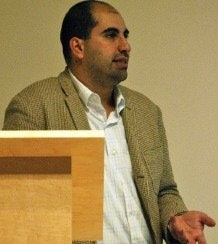 Professor Steven Salaita’s Twitter postings are at the center of the controversy over the boundaries of academic freedom.
Professor Steven Salaita’s Twitter postings are at the center of the controversy over the boundaries of academic freedom.URBANA, Ill. ― The University of Illinois is facing scrutiny as classes resume from some of its faculty, other academics and students over its decision to rescind a job offer to a professor after his prolific, sometimes profane use of Twitter to voice anger at Israel.
Phyllis Wise, chancellor of the university’s Urbana-Champaign campus, says she decided not to hire Steven Salaita, a professor of American Indian studies, over concerns about what she called demeaning and abusive language. She heard by email from several dozen students, parents and financial donors expressing concerns, some of whom accused Salaita of anti-Semitism.
Salaita’s defenders say the decision violates his academic freedom, a concept that, along with the tenure that shields professors from fallout over unpopular or controversial opinions, goes far beyond the legal protections shared by workers in most businesses.
“As far as I am concerned, this would never (have) happened without external pressure,” said Robert Warrior, chairman of the university’s American Indian Studies Program.
Salaita was an English professor at Virginia Tech University when in October 2013 he accepted an offer to become a professor in the University of Illinois’ American Indian Studies Program, scheduled to start in the fall of 2014 with a salary of $85,000.
But in July, as Israel and the Palestinians battled in Gaza, Salaita frequently used Twitter—sometimes authoring dozens of messages a day, many with obscenities—criticizing Israel, Arab nations and others. For example, in a post on July 20, he wrote: “Zionists: transforming ‘antisemitism’ from something horrible into something honorable since 1948.”
Emails recently released by the university to The Associated Press show that dozens of people urged Wise in July and early August not to hire Salaita.
“Alarming enough is Mr. Salaita’s unwillingness to even hear opposing views,” read an email from a student whose identity was redacted by the university. “But what truly crosses the line is his anti-Semitic rhetoric.”
On Aug. 1, Wise wrote Salaita telling him without explanation that he had no job. After complaints about the decision grew, she emailed faculty and students on Aug. 22 to say the decision was based on Salaita’s tone rather than his views on Israel.
“What we cannot and will not tolerate at the University of Illinois are personal and disrespectful words or actions that demean and abuse either viewpoints themselves or those who express them,” she wrote.
A statement of “unwavering support” for Wise was signed by the board of trustees, university President Robert Easter and Donald Chambers, a professor and chairman of the University Senates Conference, which represents faculty leaders from all three university campuses.
Salaita didn’t respond to requests for comment, but one of his attorneys said Friday that, since the university is a state institution, he believes Salaita was denied his constitutional rights.
“It is unconstitutional for a public entity to punish someone for a viewpoint,” said Baher Azmy of the Center for Constitutional Rights, adding that he believes the decision was based on “the content of his speech.”
Salaita’s supporters have been vocal.
More than 500 academics from Illinois and elsewhere signed an online petition supporting Salaita, whose father is from Jordan and mother from Nicaragua, according to his online biography. Faculty at the university’s American Indian Studies Program, Department of Asian American Studies and Philosophy Department have approved votes of no confidence in Wise, and about 100 people attended a protest on campus supporting Salaita on Tuesday.
The American Association of University Professors (AAUP) wrote to Wise on Friday, saying it was concerned the university may have denied Salaita academic freedom he was due. The letter also said it appears Salaita was, as his defenders claim, essentially a university employee when the offer was withdrawn.
Jack Schuster, an expert on higher education issues, said that, while Salaita may have gone too far, he agrees that he was due the protection granted tenured faculty.
“The U of I may well have been unwise … in extending an offer to Mr. Salaita. Nonetheless, principles of academic freedom probably should prevail,” said Schuster, a professor emeritus of education and public policy at Claremont Graduate University in California.
But one former president of the AAUP believes Wise did the right thing. Cary Nelson, a University of Illinois English professor, said the university had a right to change its mind because the administration’s offer to Salaita had not received final approval from the Board of Trustees.
“You can decide if the person is a good fit—he toyed with anti-Semitic rhetoric and made sure it went out in the world,” Nelson said.















